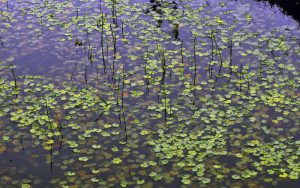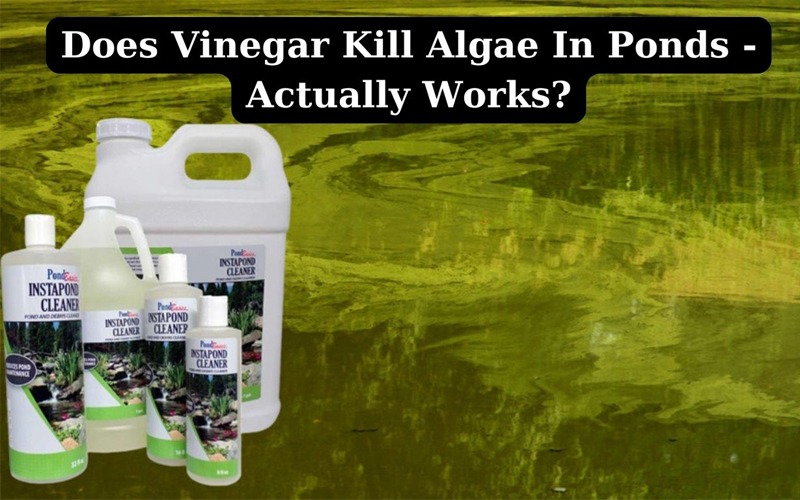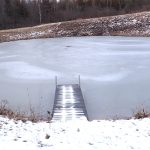Too much algae in a pond harms fish by depleting oxygen and producing toxins. It disrupts the ecosystem, outcompeting beneficial plants and degrading water quality.
Algae in ponds often result from an excess of nutrients, sunlight, and poor water circulation. You may also suffer from too many algae in your pond and plan to control pond algae using vinegar.
But you really don’t know whether vinegar kills algae in ponds or not. Well, yes, vinegar especially white vinegar, a strong acid, effectively combats pond algae when mixed with water in a 1:10 ratio.
But remember, it provides a temporary solution, caution is required to prevent harm to fish. Addressing underlying issues like nutrient excess and sunlight is crucial for sustained algae control.
Alternatives such as barley straw, beneficial bacteria, pond dyes, and ensuring proper aeration offer comprehensive, long-term strategies for maintaining a balanced pond environment.
Today in this article we will tell you does vinegar effectively kills vinegar in ponds or not. And if then what types of vinegar are best and does vinegar cause any harmfulness in the pond or not? So without wasting time let’s jump to the article.
Does Vinegar Effectively Kill Algae In Ponds

Vinegar, with its acidic nature, is recognized for its potential in addressing algae issues in ponds. Specifically, white vinegar is favored for its heightened acidity compared to other variants.
The recommended dilution of 1:10, mixing vinegar with water, aims to strike a balance between effectiveness and avoiding harm to aquatic life.
The application involves directly administering the diluted solution to areas afflicted by algae. This targeted method minimizes the risk of negatively impacting the pond’s inhabitants.
However, a cautious approach is vital to prevent unintended consequences on fish and other aquatic organisms.
The timeframe for observing results can vary, influenced by factors such as algae type and overall pond conditions.
While some users report success, patience is essential, as it may take several days to weeks to witness a substantial reduction in algae growth.
While vinegar offers a short-term remedy, it might not be a sustainable, long-term solution. To comprehensively address algae overgrowth, attention should be directed towards underlying factors like nutrient levels, sunlight exposure, and pond circulation.
Considering alternative methods for algae control is advisable. Barley straw, beneficial bacteria, pond dyes, and aeration present diverse strategies to maintain a harmonious pond environment.
Integrating these alternatives into a holistic management approach enhances the potential for sustained algae control and overall pond health.
So, while vinegar can be a valuable asset in the battle against pond algae, its effectiveness hinges on careful application, consideration of the pond’s ecosystem, and a broader management strategy.
Diligence in execution and an awareness of the diverse factors at play contribute to successful algae control and the preservation of a thriving pond environment.
What Type Of Vinegar Is Best For Killing Algae In Ponds
The type of vinegar often recommended for killing algae in ponds is white vinegar. White vinegar is a distilled form of vinegar known for its higher acidity compared to other varieties.
The increased acidity enhances its effectiveness in disrupting the cellular structure of algae. When used in moderation and properly diluted, white vinegar can be a suitable solution for controlling algae growth in ponds.
It’s important to avoid using vinegar with additional ingredients, as they may have adverse effects on the pond’s ecosystem. As with any treatment, caution and responsible application are crucial to prevent harm to fish and other aquatic life in the pond.
How Do I Apply Vinegar To My Pond To Kill Algae
Hope now it’s clear to you whether will vinegar kill fish in a pond or not. So, while you are thinking of applying vinegar to your pond you should follow some steps. These steps will help you to get the most effective result.
Dilution:
Mix white vinegar with water in a ratio of 1 part vinegar to 10 parts water. This ratio helps to balance the acidity and reduce the risk of harming fish and other aquatic life.
Measurements:
Calculate the amount of vinegar needed based on the size of your pond. Ensure that the vinegar is evenly distributed throughout the pond.
Targeted Application:
Identify areas with significant algae growth. Directly pour the diluted vinegar into these areas. Using a watering can or a sprayer can help distribute the mixture more evenly.
Avoid Excess:
Exercise caution not to use excessive amounts of vinegar, as this can alter the water chemistry and potentially harm the pond’s ecosystem.
Repeat as Needed:
Once you apply wait for a couple of days, because it takes time to start work. Anyway, if you don’t know how fast vinegar kills algae in ponds then you can check our previous article.
Depending on the severity of the algae problem, you may need to repeat the application. However, it’s advisable to wait and observe the effects before applying more vinegar.
Monitor Effectiveness:
Be patient and monitor the pond over the following days to weeks. Changes in algae growth may take some time to become noticeable.
Consider Other Factors:
While vinegar can be a helpful short-term solution, consider addressing underlying factors contributing to algae growth, such as nutrient levels, sunlight exposure, and pond circulation.
Alternative Methods:
Explore alternative methods for algae control, such as using barley straw, beneficial bacteria, pond dyes, and ensuring proper aeration. Combining these methods with responsible pond management practices can provide a more comprehensive approach.
Will Vinegar Harm Fish And Other Aquatic Life In The Pond

So here in this article, we have already told you does vinegar kills algae in ponds or not. Here we will provide you an important information that you must look at before applying vinegar to your pond.
Will vinegar harm fish and other aquatic life in ponds? Let’s see,
Yes, vinegar has the potential to harm fish and other aquatic life in a pond if not used cautiously. Vinegar’s acidity, while effective against algae, can alter the pond’s pH and water chemistry, affecting the well-being of fish.
To minimize harm, it is recommended to dilute vinegar with water in a ratio of 1:10. Starting with a lower concentration and observing fish behavior during and after application is crucial to ensure their safety.
Signs of stress or discomfort may indicate the need for corrective measures, such as water changes or using dechlorinators to neutralize acidity.
While vinegar can be a short-term solution for algae control, responsible application and consideration of its impact on the entire pond ecosystem are vital.
Pond owners should also explore alternative methods, such as beneficial bacteria or barley straw, to maintain a healthy balance in the pond environment without posing risks to fish and aquatic life.
If uncertainties arise, seeking guidance from pond experts or local extension services is advisable to promote the overall well-being of the pond and its inhabitants.
Frequently Asked Questions
Q: How long does it take for vinegar to work on algae in ponds?
A: The time it takes for vinegar to work on algae in ponds varies. Results may become noticeable within days to weeks. Patience is important, and factors like algae type, pond size, and overall conditions influence the timeframe for effectiveness.
Q: Can I use vinegar as a long-term solution for controlling algae in my pond?
A: Using vinegar as a long-term solution for controlling pond algae is not advisable. While it can offer temporary relief, addressing underlying issues like nutrient levels and sunlight exposure is essential for sustained algae control and overall pond health.
Q: Are there any alternatives to using vinegar for algae control in ponds?
A: Certainly, alternatives to vinegar for algae control in ponds include using barley straw, beneficial bacteria, pond dyes, and ensuring proper aeration.
These methods offer diverse approaches, contributing to a comprehensive strategy for maintaining a balanced and healthy pond environment without relying solely on vinegar.
Q: Can I use household cleaning vinegar for treating pond algae?
A: Using household cleaning vinegar for treating pond algae is not recommended. It may contain additional ingredients harmful to aquatic life. Stick to distilled white vinegar for pond applications.
Final Words
Now it’s clear to you does vinegar kill algae in ponds or not? Hope this article will be helpful for you. Here we have discussed all the related questions about vinegar applied in ponds.
If you like this article, share it with your friends. If you want to know other pond-related info then stay with us, here we publish all pond-related articles that are very helpful for fish farmers.





